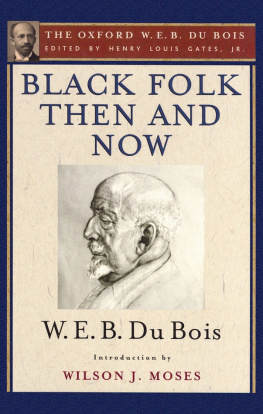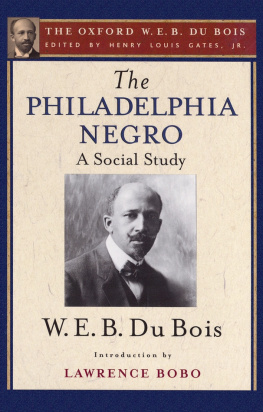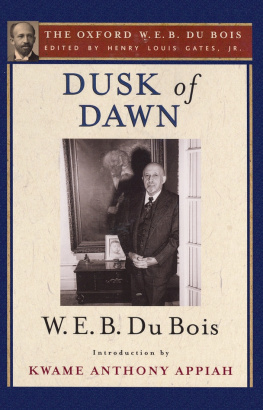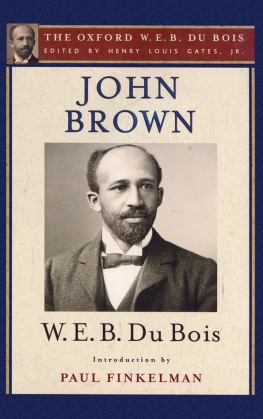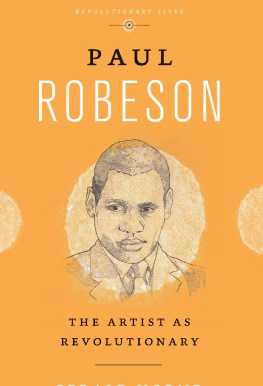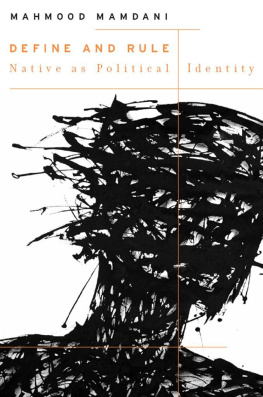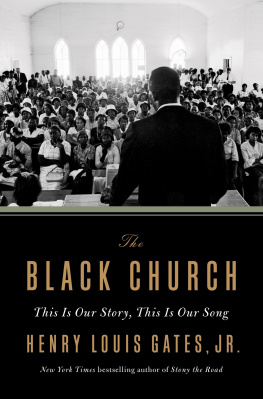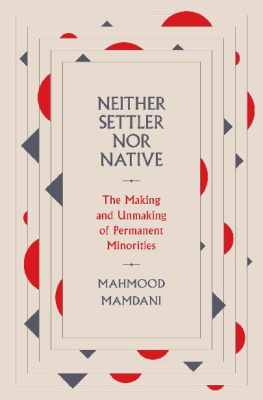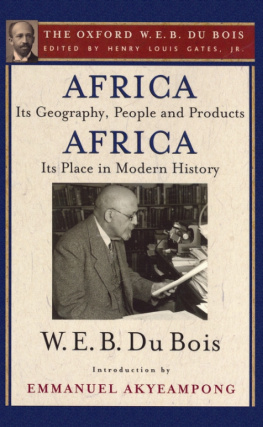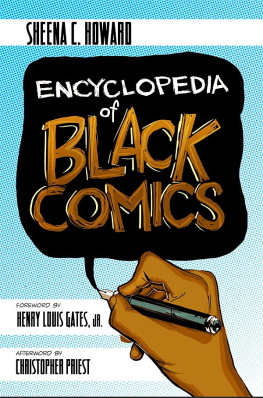Gates Henry Louis Jr. - Black Folk Then and Now
Here you can read online Gates Henry Louis Jr. - Black Folk Then and Now full text of the book (entire story) in english for free. Download pdf and epub, get meaning, cover and reviews about this ebook. year: 2013, publisher: Oxford University Press, genre: Science. Description of the work, (preface) as well as reviews are available. Best literature library LitArk.com created for fans of good reading and offers a wide selection of genres:
Romance novel
Science fiction
Adventure
Detective
Science
History
Home and family
Prose
Art
Politics
Computer
Non-fiction
Religion
Business
Children
Humor
Choose a favorite category and find really read worthwhile books. Enjoy immersion in the world of imagination, feel the emotions of the characters or learn something new for yourself, make an fascinating discovery.
- Book:Black Folk Then and Now
- Author:
- Publisher:Oxford University Press
- Genre:
- Year:2013
- Rating:4 / 5
- Favourites:Add to favourites
- Your mark:
- 80
- 1
- 2
- 3
- 4
- 5
Black Folk Then and Now: summary, description and annotation
We offer to read an annotation, description, summary or preface (depends on what the author of the book "Black Folk Then and Now" wrote himself). If you haven't found the necessary information about the book — write in the comments, we will try to find it.
Black Folk Then and Now — read online for free the complete book (whole text) full work
Below is the text of the book, divided by pages. System saving the place of the last page read, allows you to conveniently read the book "Black Folk Then and Now" online for free, without having to search again every time where you left off. Put a bookmark, and you can go to the page where you finished reading at any time.
Font size:
Interval:
Bookmark:

THE OXFORD W. E. B. DU BOIS
Henry Louis Gates, Jr., Editor
The Suppression of the African Slave-Trade to the United States of America: 16381870
Introduction: Saidiya Hartman
The Philadelphia Negro: A Social Study
Introduction: Lawrence Bobo
The Souls of Black Folk
Introduction: Arnold Rampersad
John Brown
Introduction: Paul Finkelman
Africa, Its Geography, People and Products
AfricaIts Place in Modern History
Introductions: Emmanuel Akyeampong
Black Reconstruction in America
Introduction: David Levering Lewis
Black Folk: Then and Now
Introduction: WilsonJ.Moses
Dusk of Dawn
Introduction: Kwame Anthony Appiah
The World and Africa
Color and Democracy: Colonies and Peace
Introductions: Mahmood Mamdani and Gerald Horne
In Battle for Peace: The Story of My Eighty-third Birthday
Introduction: Manning Marable
The Black Flame Trilogy: Book One
The Ordeal of Mansart
Introduction: Brent Edwards
Afterword: Mark Sanders
The Black Flame Trilogy: Book Two
Mansart Builds a School
Introduction: Brent Edwards
Afterword: Mark Sanders
The Black Flame Trilogy: Book Three
Worlds of Color
Introduction: Brent Edwards
Afterword: Mark Sanders
Autobiography of W. E. B. Du Bois
Introduction: Werner Sollars
The Quest of the Silver Fleece
Introduction: WilliamL. Andrews
The Negro
Introduction: JohnK. Thornton
Darkwater: Voices from Within the Veil
Introduction: Evelyn Brooks Higginbotham
Gift of Black Folk: The Negroes in the Making of America
Introduction: Glenda Carpio
Dark Princess: A Romance
Introduction: HomiK. Bhabha
Then and Now

An Essay in the History and Sociology of the Negro Race
W. E. B. Du Bois
Series Editor, Henry Louis Gates, Jr.
Introduction by Wilson Moses

For Cornel West

Oxford University Press, Inc., publishes works that further
Oxford Universitys objective of excellence in research,
scholarship, and education.
Oxford New York
Auckland Cape Town Dar es Salaam Hong Kong Karachi
Kuala Lumpur Madrid Melbourne Mexico City Nairobi
New Delhi Shanghai Taipei Toronto
With offices in
Argentina Austria Brazil Chile Czech Republic France Greece
Guatemala Hungary Italy Japan Poland Portugal Singapore
South Korea Switzerland Thailand Turkey Ukraine Vietnam
Copyright 2007 by Oxford University Press
Published by Oxford University Press, Inc.
198 Madison Avenue, New York, NY 10016
www.oup.com
Oxford is a registered trademark of Oxford University Press
All rights reserved. No part of this publication may be reproduced,
stored in a retrieval system, or transmitted, in any form or by any means,
electronic, mechanical, photocopying, recording, or otherwise,
without the prior permission of Oxford University Press.
Library of Congress Cataloging-in-Publication Data is available.
ISBN: 978-0-19-531180-8 (Series)
ISBN: 978-0-19-532582-9 (Volume)
THIS BOOK
IS DEDICATED TO
MY GRANDDAUGHTER
DU BOIS WILLIAMS
ON HER SIXTH BIRTHDAY IN
THE HOPE THAT HER BRIGHT
EYES MAY ONE DAY SEE
SOME OF THE THINGS
I DREAM
Contents
the slave master had a direct interest in discrediting the personality of those he held as property. Every man who had a thousand dollars so invested had a thousand reasons for painting the black man as fit only for slavery. Having made him the companion of horses and mules, he naturally sought to justify himself by assuming that the negro was not much better than a mule. The holders of twenty hundred million dollars worth of property in human chattels procured the means of influencing press, pulpit, and politician, and through these instrumentalities they belittled our virtues and magnified our vices, and have made us odious in the eyes of the world. Slavery had the power at one time to make and unmake Presidents, to construe the law, and dictate the policy, set the fashion in national manners and customs, interpret the Bible, and control the church; and, naturally enough, the old masters set themselves up as much too high as they set the manhood of the negro too low. Out of the depths of slavery has come this prejudice and this color line. It is broad enough and black enough to explain all the malign influences which assail the newly emancipated millions to-day.... The office of color in the color line is a very plain and subordinate one. It simply advertises the objects of oppression, insult, and persecution. It is not the maddening liquor, but the black letters on the sign telling the world where it may be had ... Slavery, stupidity, servility, poverty, dependence, are undesirable conditions. When these shall cease to be coupled with color, there will be no color line drawn.
FREDERICK DOUGLASS, The Color Line, 1881.
William Edward Burghardt Du Bois (18681963) was the most prolific and, arguably, the most influential African American writer of his generation. The novelist and poet James Weldon Johnson (18711938) once noted the no single work had informed the shape of the African American literary tradition, except perhaps Uncle Toms Cabin, than had Du Boiss seminal collection of essays The Souls of Black Folk (1903). While trained as a sociologist at Berlin and as a historian at Harvard, Du Bois was fearless in the face of genreeven when some of the genres that he sought to embrace did not fully embrace him in return. Du Bois published twenty-two single-author works, twenty-one in his lifetime (his Autobiography, edited by his friend and literary executor, Herbert Aptheker, would not be published until 1968). A selection of his greatest works, An ABC of Color: Selections from over a Half Century of the Writings of W. E. B. Du Bois, appeared in 1963, the year he died. And while these books reflect a wide variety of genresincluding three widely heralded and magisterial books of essays published in 1903, 1920, and 1940 (The Souls of Black Folk, Darkwater: Voices from within the Veil, and Dusk of Dawn: An Essay toward an Autobiography of a Race Concept), one biography, five novels, a pioneering sociological study of a black community, five books devoted to the history of Africa, three historical studies of African American people, among othersDu Bois was, in the end, an essayist, an essayist of the first order, one of the masters of that protean form that so attracted Du Boiss only true antecedent, Frederick Douglass (18181895) as well as Du Boiss heir in the history of the form, James Baldwin (19241987). (Baldwin, like Du Bois, would turn repeatedly to fiction, only to render the form as an essay.)
Du Bois, clearly, saw himself as a man of action, but a man of action who luxuriated within a verdant and fecund tropical rainforest of words. It is not Du Boiss intoxication with words that marks his place in the history of great black public intellectualspersons of letters for whom words are a vehicle for political action and their own participation in political movements. After all, one need only recall Du Boiss predecessor, Frederick Douglass, or another of his disciples, Martin Luther King Jr. for models in the African American tradition of leaders for whom acting and speaking were so inextricably intertwined as to be virtually coterminous; no, the novelty of Du Boiss place in the black tradition is that he wrote himself to a power, rather than spoke himself to power. Both Douglass and King, for all their considerable literary talents, will be remembered always for the power of their oratory, a breathtaking power exhibited by both. Du Bois, on the other hand, was not a great orator; he wrote like he talked, and he talked like an extraordinarily well-educated late Anglo-American Victorian, just as James Weldon Johnson did; no deep black stentorian resonances are to be found in the public speaking voices of either of these two marvelous writers. Booker T. Washington (18561915) spoke in a similar public voice.
Font size:
Interval:
Bookmark:
Similar books «Black Folk Then and Now»
Look at similar books to Black Folk Then and Now. We have selected literature similar in name and meaning in the hope of providing readers with more options to find new, interesting, not yet read works.
Discussion, reviews of the book Black Folk Then and Now and just readers' own opinions. Leave your comments, write what you think about the work, its meaning or the main characters. Specify what exactly you liked and what you didn't like, and why you think so.

